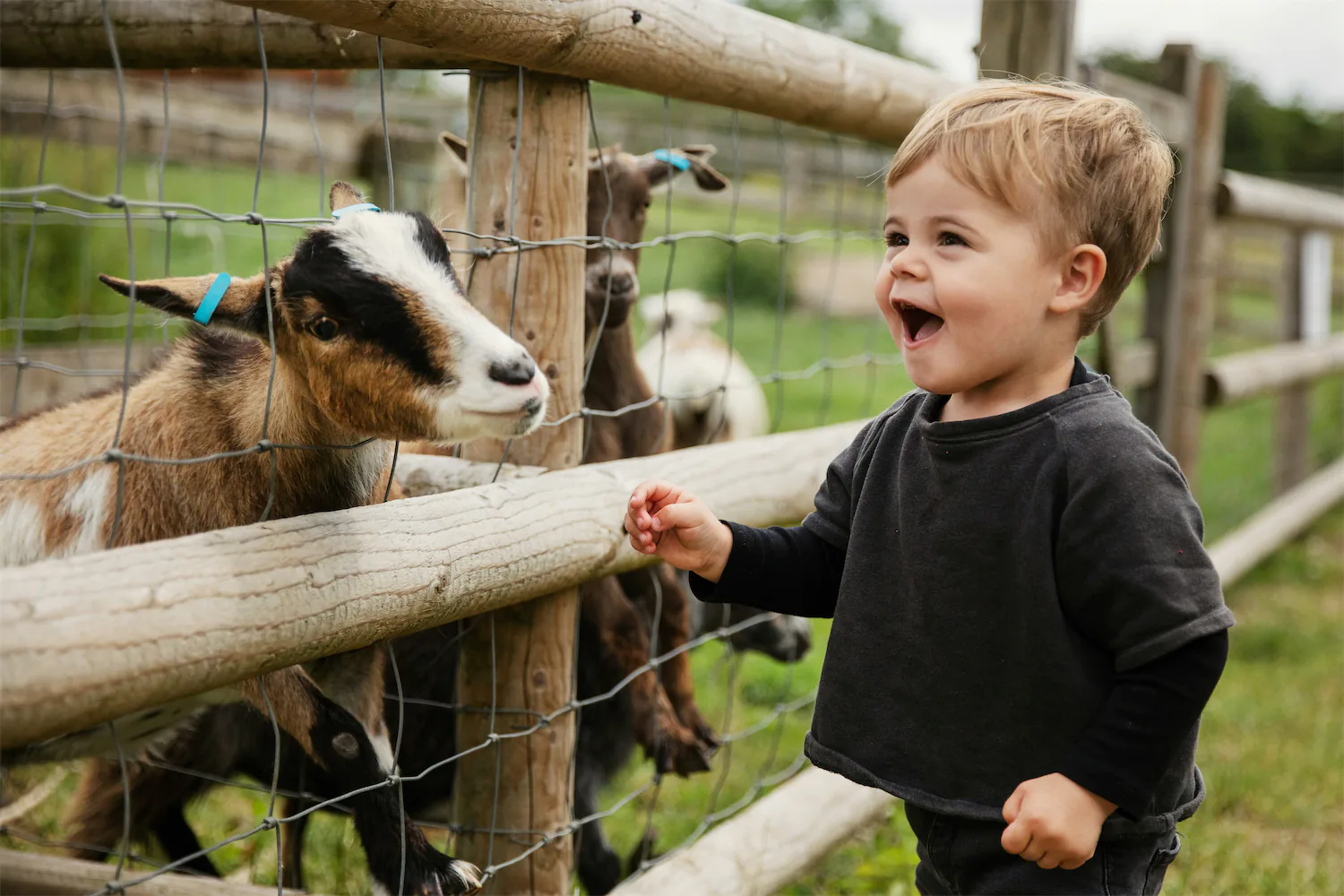Milestone and development for six-year-olds
Milestone and development for six-year-olds

Dahlia Rimmon, RDN
Content Writer

Jennifer Gillette, MA
Child Development & Behavior Specialist



Physical and motor milestones for six-year-olds
At this age, children become more confident in physical activities like running, jumping, skipping, and climbing. They typically show more coordinated movement as both gross and fine motor skills become more refined. Most six-year-olds can ride a two-wheeled bike, catch and throw with greater accuracy, and have more control over fine motor skills like using a scissor or tying their shoes.
Physical milestones
Jump rope
Paint and draw with more precision
Write their own name
Catch a ball
Dress themselves independently
Climb
Cognitive milestones for six-year-olds
As six-year-olds begin school, they start to grasp new ideas, understand more complex concepts, and expand their view of the world.
Cognitive milestones
Count beyond 20
Understand simple math concepts, like addition and subtraction
Begin to grasp the concept of time and tell time on a clock
Show strong curiosity and frequently ask questions
Demonstrate a longer attention span
Follow multi-step directions with greater consistency
Emotional and social milestones for six-year-olds
At six, children begin forming deeper friendships and often enjoy playing in small groups. They start to experience more complex emotions, such as guilt and embarrassment, and show a growing understanding of rules, fairness, and cooperation. Despite these developments, they still need support in managing big feelings like frustration and disappointment.
Speech and language milestones for six-year-olds
Children begin to speak in more detailed and complex sentences and can tell stories that include a clear beginning, middle, and end. Their vocabulary continues to grow, and many six-year-olds enjoy playing with language through jokes and rhymes.
Speech and language milestones
Develop stronger conversation skills
Can read simple words and sentences
Can express their thoughts
Can describe their favorite toy, move, or character
Uses correct grammar in speech most of the time
Tips to encourage development
Establish a consistent routine that includes time for rest, play, learning, and social interaction to create predictability. Similarly, be consistent with family rules and clearly communicate your expectations so your child knows what to expect and what’s expected of them.
Encourage independence by allowing your child to make choices, take part in household tasks, and take on age-appropriate responsibilities. This will help build confidence and self-esteem.
Read together daily to support language development, improve literacy skills, and strengthen speech skills.
Provide plenty of opportunity for physical activity to support physical development.
Be available to talk about their day and validate their feelings to help your child develop emotional awareness and communication skills. This one-on-one time will also provide a sense of security and comfort.
Limit screen time and offer open-ended toys like blocks, art supplies, or pretend play materials to encourage creativity and independent thinking.
Collaborate with teachers and caregivers to ensure consistency in expectations and learning goals.
Use positive reinforcement to encourage good behavior, focusing on teaching and guiding.
Stay patient and calm, recognizing that six-year-olds are still learning how to manage big feelings and social dynamics.
When to consult a pediatrician
Parents should consult a pediatrician if they notice:
Significant delays or regressions in development
If your child avoids social interaction, withdraws from group activities, or shows little interest in making friends
Struggles to follow simple instructions, especially when it impacts learning, daily routines, or classroom behavior
Has ongoing worries, anxiety, or aggression, particularly if it interferes with home life, school, or relationships
Delays or difficulties with motor coordination, such as frequent tripping, trouble using utensils, or difficulty with tasks like self-dressing.
Any persistent issues with vision, hearing, or learning that affect the child’s ability to participate fully in activities should be addressed.
If you have questions about your child’s development, reach out to your local or Summer Health pediatrician for support. Summer Health is a pediatric telehealth platform offering 24/7 care, providing answers for everything from urgent concerns to everyday questions about your child’s health.
Physical and motor milestones for six-year-olds
At this age, children become more confident in physical activities like running, jumping, skipping, and climbing. They typically show more coordinated movement as both gross and fine motor skills become more refined. Most six-year-olds can ride a two-wheeled bike, catch and throw with greater accuracy, and have more control over fine motor skills like using a scissor or tying their shoes.
Physical milestones
Jump rope
Paint and draw with more precision
Write their own name
Catch a ball
Dress themselves independently
Climb
Cognitive milestones for six-year-olds
As six-year-olds begin school, they start to grasp new ideas, understand more complex concepts, and expand their view of the world.
Cognitive milestones
Count beyond 20
Understand simple math concepts, like addition and subtraction
Begin to grasp the concept of time and tell time on a clock
Show strong curiosity and frequently ask questions
Demonstrate a longer attention span
Follow multi-step directions with greater consistency
Emotional and social milestones for six-year-olds
At six, children begin forming deeper friendships and often enjoy playing in small groups. They start to experience more complex emotions, such as guilt and embarrassment, and show a growing understanding of rules, fairness, and cooperation. Despite these developments, they still need support in managing big feelings like frustration and disappointment.
Speech and language milestones for six-year-olds
Children begin to speak in more detailed and complex sentences and can tell stories that include a clear beginning, middle, and end. Their vocabulary continues to grow, and many six-year-olds enjoy playing with language through jokes and rhymes.
Speech and language milestones
Develop stronger conversation skills
Can read simple words and sentences
Can express their thoughts
Can describe their favorite toy, move, or character
Uses correct grammar in speech most of the time
Tips to encourage development
Establish a consistent routine that includes time for rest, play, learning, and social interaction to create predictability. Similarly, be consistent with family rules and clearly communicate your expectations so your child knows what to expect and what’s expected of them.
Encourage independence by allowing your child to make choices, take part in household tasks, and take on age-appropriate responsibilities. This will help build confidence and self-esteem.
Read together daily to support language development, improve literacy skills, and strengthen speech skills.
Provide plenty of opportunity for physical activity to support physical development.
Be available to talk about their day and validate their feelings to help your child develop emotional awareness and communication skills. This one-on-one time will also provide a sense of security and comfort.
Limit screen time and offer open-ended toys like blocks, art supplies, or pretend play materials to encourage creativity and independent thinking.
Collaborate with teachers and caregivers to ensure consistency in expectations and learning goals.
Use positive reinforcement to encourage good behavior, focusing on teaching and guiding.
Stay patient and calm, recognizing that six-year-olds are still learning how to manage big feelings and social dynamics.
When to consult a pediatrician
Parents should consult a pediatrician if they notice:
Significant delays or regressions in development
If your child avoids social interaction, withdraws from group activities, or shows little interest in making friends
Struggles to follow simple instructions, especially when it impacts learning, daily routines, or classroom behavior
Has ongoing worries, anxiety, or aggression, particularly if it interferes with home life, school, or relationships
Delays or difficulties with motor coordination, such as frequent tripping, trouble using utensils, or difficulty with tasks like self-dressing.
Any persistent issues with vision, hearing, or learning that affect the child’s ability to participate fully in activities should be addressed.
If you have questions about your child’s development, reach out to your local or Summer Health pediatrician for support. Summer Health is a pediatric telehealth platform offering 24/7 care, providing answers for everything from urgent concerns to everyday questions about your child’s health.
Summer Health offers fast and reliable pediatric urgent care through online doctors, all via text. Whether you’re worried about your baby's fever, rashes, or other children's health concerns, we provide expert advice and support anytime, right from your phone.

Never miss a post!
Sign up for our newsletter to receive articles and guides directly to your inbox!












